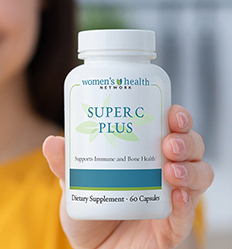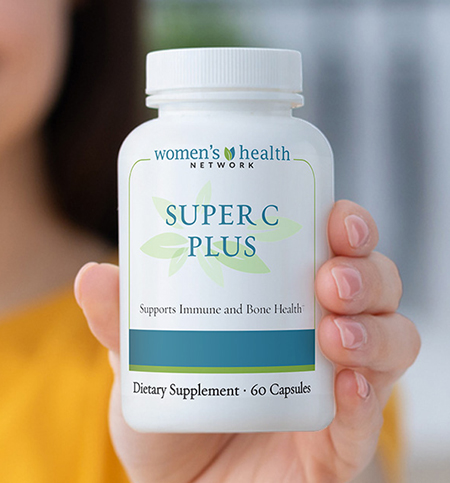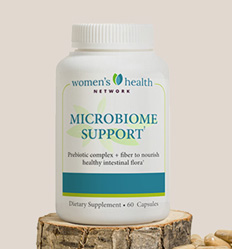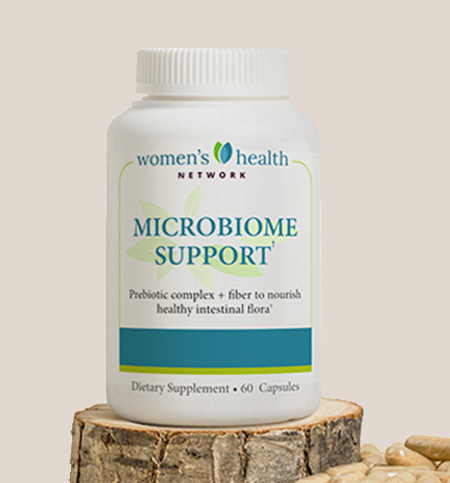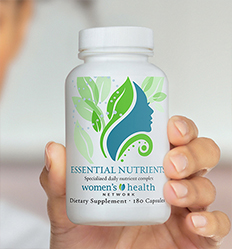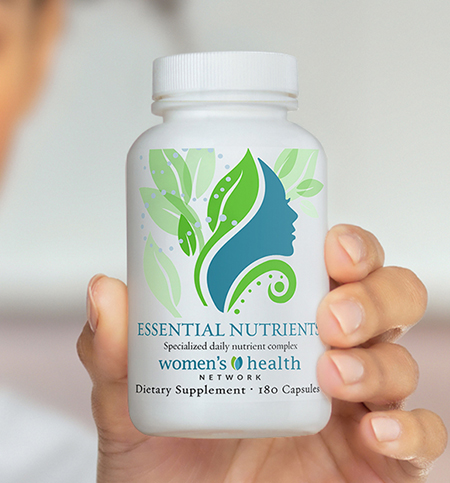Authored by Dr. Susan E. Brown, PhD
I often wonder how strange health fads get started. I’m talking about those “natural miracle cures” that just make no sense, yet somehow become a popular craze nonetheless. For a current example, look no further than the celery juice fad.
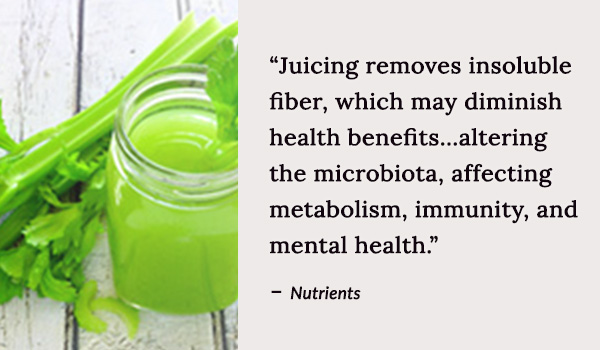
Celery has its pluses — juicing has its minuses
Celery contains a wealth of helpful nutrients: potassium, folate, and Vitamins A, C, and K, as well as a significant amount of antioxidants — and water (celery is mostly water). Celery, thanks to its husky stalk, is also rich in fiber, a substance that offers many positive effects for the human body.
Among them, fiber is incredibly beneficial for healthy gut flora and can assist in lowering cholesterol and stabilizing blood sugar, and also helps to “keep you regular.”And this is where the theory of celery juice as a miracle health elixir begins to break down. “Juicing” celery separates the liquids from the fibrous stalk, so what ends up in your glass is essentially fiber-free. No fiber in your celery juice means no benefits of fiber.What about pureeing celery in a blender until the pulp is broken down into a drinkable slurry?
Yes, there is fiber in it. But no, you won’t get the maximum benefits of it. Why? For the simple reason that a lot of the positives don’t come from the celery fiber itself — they come from the microbes that are already in the gut waiting for a nice helping of fiber to process into small-chain fatty acids. It’s the act of processing the fiber that produces the byproducts that support a healthy gut and suppress competitive (sometimes pathogenic) bacteria.
If the fiber arrives in the gut already broken down by your blender, the gut microbes have less to do, so your gut doesn’t get the full benefit — the way it would if you just ate those celery stalks instead of juicing them.
More reasons to rethink celery juice
If fiber was the only issue with the celery juice fad, it wouldn’t really be enough to raise the red flag. After all, there are plenty of other ways to get fiber in your diet, and it’s certainly understandable why some people get turned off by the stringy, fibrous texture of the celery stalk. But here are several more reasons to be wary.
First, the celery juice fad is really the brainchild of one person, a social media influencer calling himself Anthony William, aka the “Medical Medium.” Mr William, who has zero medical credentials, credits his “knowledge” of celery’s properties to — according to his website — “the unique ability to converse with Spirit of Compassion who provides him with extraordinarily accurate health information that’s often far ahead of its time.” Long story short, Anthony William created a trend and is profiting from it. There’s little incentive for him to provide scientific information to back up his claims.
Second, there’s no solid scientific research on celery juice itself. Searching the PubMed and Google Scholar databases turns up no information — nothing! — about celery juice and its effects in humans or on specific diseases, such as psoriasis, a common disease many claim celery juice can cure. There are a few highly specific studies on whether celery juice, added to lunch meats, is protective against pathogenic microbes like Listeria and Clostridium (it is, somewhat) and highlighting some benefits for rats treated with doxorubicin, a common cancer medication. It’s a really big stretch to say that these studies support any ability for celery juice to accomplish any of the health claims William makes for it.
As the National Psoriasis Foundation put it, in addressing a celebrity’s claim to have cured her psoriasis using celery juice, “Does the medical community back the claim that juicing celery can help clear your psoriasis and alleviate joint pain from psoriatic arthritis? Simply put, no.”Of course, there are medical trends that began with visionaries and were later proven by science to have some merit. But when you follow such visionaries in the absence of any evidence, you’re doing it based on belief, not science. We suggest that you should have at least some biological plausibility for what you are doing. And no evidence of harm or risk. But that isn’t the case with the celery juice craze. What we do have is some evidence of risk.
The science says celery juice may actually have some risks
While we have no data that shows celery juice is beneficial, there is science to show reasons why, in the amounts suggested by the juicing advocates, it might be harmful:
- It may interact with certain medications. Celery is known to inhibit the cytochrome P450 metabolic pathway, which means that any medications metabolized through that mechanism may linger in your system longer than they should. Juicing, rather than eating, celery means consuming a great deal more of the plant than you normally would if you were just eating celery stalks— perhaps three or four times as much! People taking such medications might therefore experience unpleasant or harmful side effects if they start drinking celery juice regularly — even if they previously ate celery fairly often — simply because of how much more they’re consuming.
- It may affect blood clotting. Celery has a relatively high content of vitamin K, which promotes blood clotting. While even those on blood thinners could theoretically safely consume up to 3 cups of celery in a day with few ill effects, that’s raw celery. If you’ve pureed your celery into celery juice,you may be consuming considerably more than that — so individuals who are on warfarin or other anticoagulants may be putting themselves at risk of bleeding without even realizing it. And as if that’s not enough, celery also contains coumarins, the natural precursor to warfarin — so you could be affecting how well the anticoagulant works that way, too.
Moderation is the key
Now, it would be wrong to say that celery isn’t a healthy food. It is! Celery is loaded with antioxidant and anti-inflammatory compounds, not to mention its fiber content. The basic problem with juicing celery is that a lot of what makes the celery stalk worthwhile is stripped away, while some of the phytochemicals are concentrated to the point of becoming potentially harmful. So while celery is good for you, juicing it may not be — and neither the raw stalks nor the juice have any medical evidence to support “curative” properties for any illness.
As a side effect, the fad has caused the price of organic celery to go through the roof, so you’ll also take a pretty serious hit to your wallet in search of (probably mythical) health benefits. From our perspective, whatever your health status may be, it’s always better to focus on a healthy, balanced diet with a wide range of fiber-rich vegetables and fruits, and with plenty of pure water for hydration. Always remember, you can’t go wrong with whole, natural foods.So — enjoy a crunchy stalk of celery as a snack and get a nice doses of vitamins, minerals and fiber — the way nature intended.







